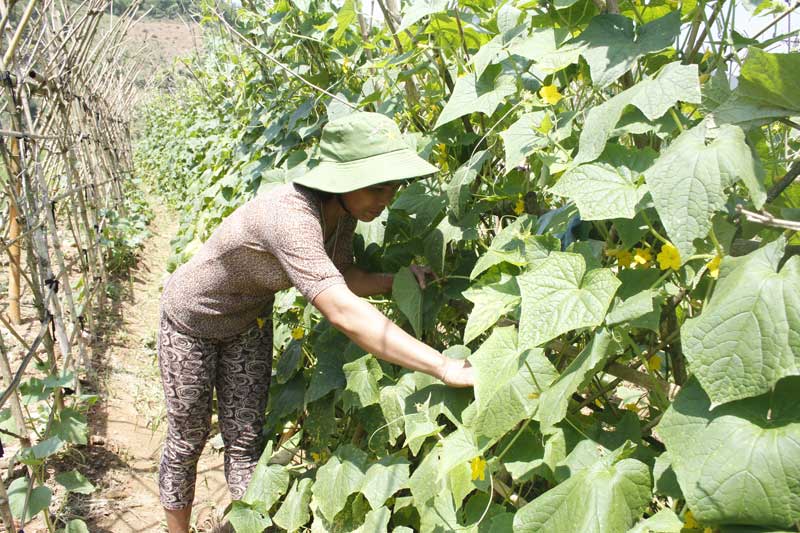
(HBO) – Xa Thi Tuyen in Chum Nua hamlet, Muong Chieng commune in Da Bac district said that her family planted cucumber in an area of 200 square metres and the vegetable sells like hot cakes while cucumber from other localities cannot find customers.
Photo: Xa Thi Tuyen in Chum
Nua hamlet, Muong Chieng commune, uses home-made herbal remedy instead of plant
protection products for her cucumber field to ensure food safety.
"Right from the beginning of the crop, I carefully prepared the soil and grew
the cucumbers organically by using well-rotted manure as fertiliser. Currently,
each kilogramme of my cucumber is sold at 10,000-15,000 VND. I also reduce the
use of plant protection products and especially use no herbicide in my rice and
maize fields”, Tuyen said.
Xa Thi Xu in Na Muoi hamlet, Muong Chieng commune said after she was told about
the harms of the use of too much plant protection chemicals to not only farmers
themselves but also to society and future generations, she has switched to
using garlic, chilli and bitter leaves to make spraying solutions. When she has
free time, she catches the caterpillars and removes weeds by hand instead of
using herbicide.
Xu plants cucumber, maize and rice. Since organic plantation was
applied in her fields, more people have come to purchase her products even at
higher prices, she said.
According to Chairman of Muong Chieng commune People’s Committee Xa Van Hung, the
communal party committee has ordered relevant authorities and mass
organisations to enhance popularisation work to raise public awareness about
the need to reduce the use of plant protection chemicals and stop the use of herbicide
in agricultural production. Many hamlets have made it a local rule not to use
pesticides.
Many households have switched to plants of higher economic value and
traditional cultivation methods using limited plant protection products. Herbicide
has no longer been used in cultivation in the commune. Local people make insect-killing
solutions from garlic, chilli and bitter leaves.
In addition, garbage is collected every Tuesday and Friday into a landfill
site, he added./.
More than just an information technology teacher, Bui Van Nien is an inspiring figure who has nurtured the scientific curiosity and creative spirit of students in Vietnam’s ethnic minority communities.
Da Bac is the most disadvantaged mountainous district in Hoa Binh province, with ethnic minorities accounting for about 90% of its population. Over the past years, the district has mobilised resources to implement ethnic policies to improve the quality of life of local people.
In recent years, Hoa Binh province has consistently prioritised the protection, care, and education of children, particularly those from ethnic minorities and disadvantaged backgrounds, by creating a safe, healthy, and nurturing environment for their all-round development.
The Steering Committee for Tobacco Harm Prevention and Control of Hoa Binh province, in coordination with the Tobacco Harm Prevention and Control Fund, held a ceremony on May 28 in response to the World No Tobacco Day (May 31) and the National No Tobacco Week (from May 25 to 31). The event was chaired by Nguyen Van Toan, Standing Vice Chairman of the provincial People’s Committee and head of the Steering Committee.
Since 2021, the Center for Industrial Promotion and Industrial Development Consulting (CIIDC) under the Department of Industry and Trade has been implementing a school lighting model as part of the plan for using energy efficiently and economically in Hoa Binh Province in the pẻiod of 2021 - 2025. This model not only aims to improve the learning conditions and enhance the education quality, but it also promotes the message of energy saving, energy security, environmental protection and contributes to the goals of socio-economic development.
In the 2024 - 2025 school year, the entire Hoa Binh provincial education sector includes 520 educational institutions and schools. Among them are 13 ethnic boarding schools with 153 classes and 4,487 students. Four of these schools have met national standards, reaching 30.7 percent.



